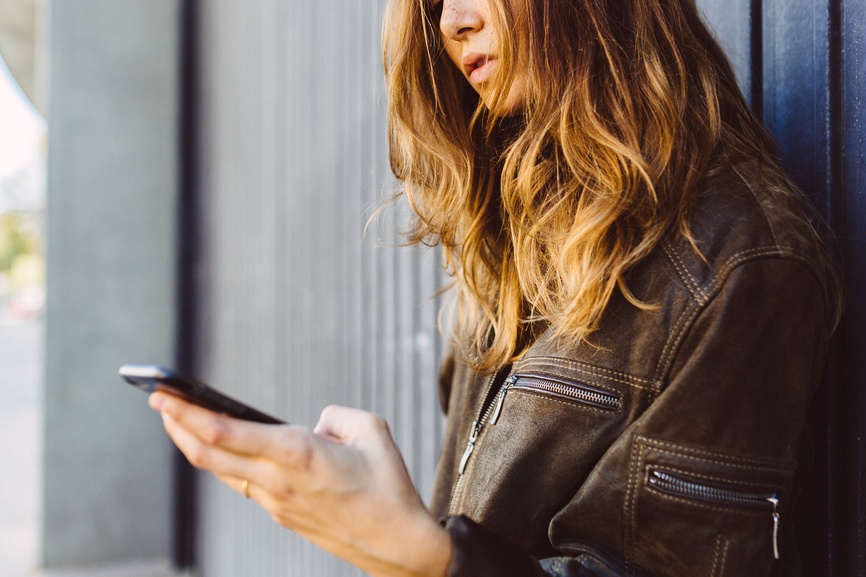I Tracked How Much Time I Spent on My Phone for Two Weeks, and…OMG
It's estimated that 66 percent of adults in the United States have nomophobia. It's become such an issue, in fact, that Apple's latest update, iOS 12, includes an app for tracking screen time to help people be more mindful of their phone usage. Google has a similar version of this included in it's Digital Wellbeing initiative as well.
I'd find myself in the middle of the workday lost in a random Instagram scroll…multiple times within a few hours. Focusing on a specific task felt really difficult, and I'd bop around from my phone to my email to writing without really getting much done.
And considering there are a whole host of problems associated with using your phone too much, I started to worry about my phone usage. I'd find myself in the middle of the workday lost in a random Instagram scroll…multiple times within a few hours. Focusing on a specific task felt really difficult, and I'd bop around from my phone to my email to writing without really getting much done. "One of the significant concerns regarding excessive smartphone usage is that it either directly or indirectly causes problems in terms of mental health and interpersonal relationships," Danielle Forshee, PsyD, LCSW says. "There is a correlation between smartphone addiction and loneliness, and problematic behaviors include desperate efforts to connect with others, losing temper, and disruptions in daily work."
Chronic phone use can also pose physical repercussions. "Our head weighs about 10 to 14 pounds—when we looked down and use our phone, the pressure and the pounds of weight on the neck can go up to 60 pounds," says Karen Joubert, physical therapist. (She works with über-cool clients like Jennifer Aniston, who doesn't even have Instagram!) Other physical ramifications of phone addiction include waking up with tingling in your hands, headaches, fogginess, and fatigue. Oh, and when you slouch to look at your phone, your diaphragm can't expand all the way, which means you don't get enough oxygen. Cool.

{{post.sponsorText}}
So, I decided to download the Moment app: It tracks the time you spend on your phone and logs how often you pick it up. You can also set screen-time limits, but I have yet to try that—because heaven forbid I get locked out of my phone when a could-be hot date texts. (I know, I know.) But also, my goal with this research mission was simply to take stock in my habits, and then decide whether or not to change my ways. To say the least, the results were eye-opening.
Here's what happened when I tracked my screen time for two weeks.

For the first few days, I tried not to alter my phone behavior so that I could get a baseline. From there, I started making changes to help me improve and cut back on my screen time. I began to notice some startling patterns, like mindlessly picking up my phone for less than a minute several times in the span of 20 minutes. One morning, between 7:07 and 7:26 a.m., I picked up my phone five times and stayed on my phone for less than a minute in each instance.
What was I even doing? There was no reason to pick up my phone, I was just doing it because I was bored. This pattern continued throughout the days. One day, by 10:30 a.m., I'd already spent 51 minutes on my phone. I'd been up for three hours, meaning nearly a third of my waking hours was being spent on my phone. Insert exploding-brain emoji here.
"Cyberloafing includes communicating with friends via social networks, checking likes, surfing the internet, or shopping online. The concern is that those who engage in quite a bit of cyberloafing may have more difficulty with self-regulation of emotions, impulse control, and self-confidence." —Danielle Forshee, PsyD
On average, I would spend around three hours on my phone a day. And it's not like I was using that time to read read scholarly articles. Nope, I was spending my precious time liking all the posts on WeRateDogs. Quality Instagram account, but definitely not the best use of my time at 2:21pm on a Wednesday.
This behavior even has a name: cyberloafing. "It includes communicating with friends via social networks, checking likes, surfing the internet, or shopping online," Dr. Forshee says. "The concern is that those who engage in quite a bit of cyberloafing may have more difficulty with self-regulation of emotions, impulse control, and self-confidence."
Yikes, I certainly don't want any of those things to be more difficult than they already are. But cyberloafing proved to be quite the addictive drug, no matter how hard I tried to curb it. Eventually though, I found a way to have some success: I started keeping my phone out of sight and out of reach. Like magic, I cut my phone usage time in half—just by storing it not physically close.
The screen-time tracking experiment definitely served as a wake-up call. After tracking my mind-blowing amount of screen-time usage for two weeks, I'd like to say that I've put the kibosh on the vice, but…I mean, I've picked up my phone 50 times today alone. Admitting you have a problem is the first step, right?
Another good step? Creating a goal. Mine is to get my average screen time down to an hour a day. Sometimes I hit that, sometimes I cyberloaf to oblivion. It's a process, but I'm making progress, and that's a status worth liking.
Why not just try a digital detox? It might make you happier and improve your relationship.
Loading More Posts...